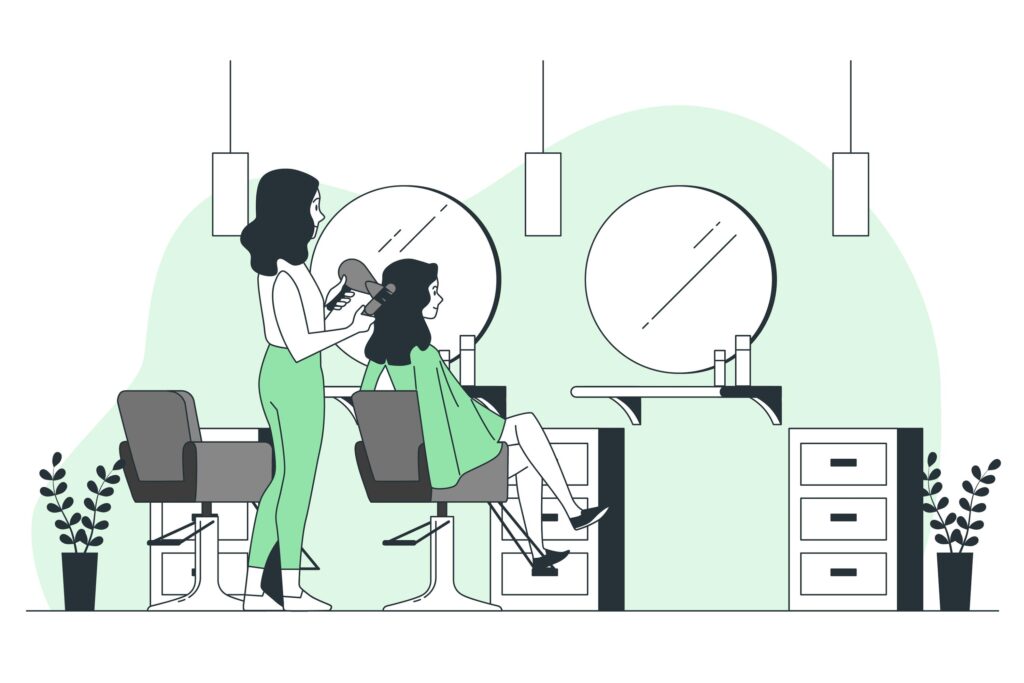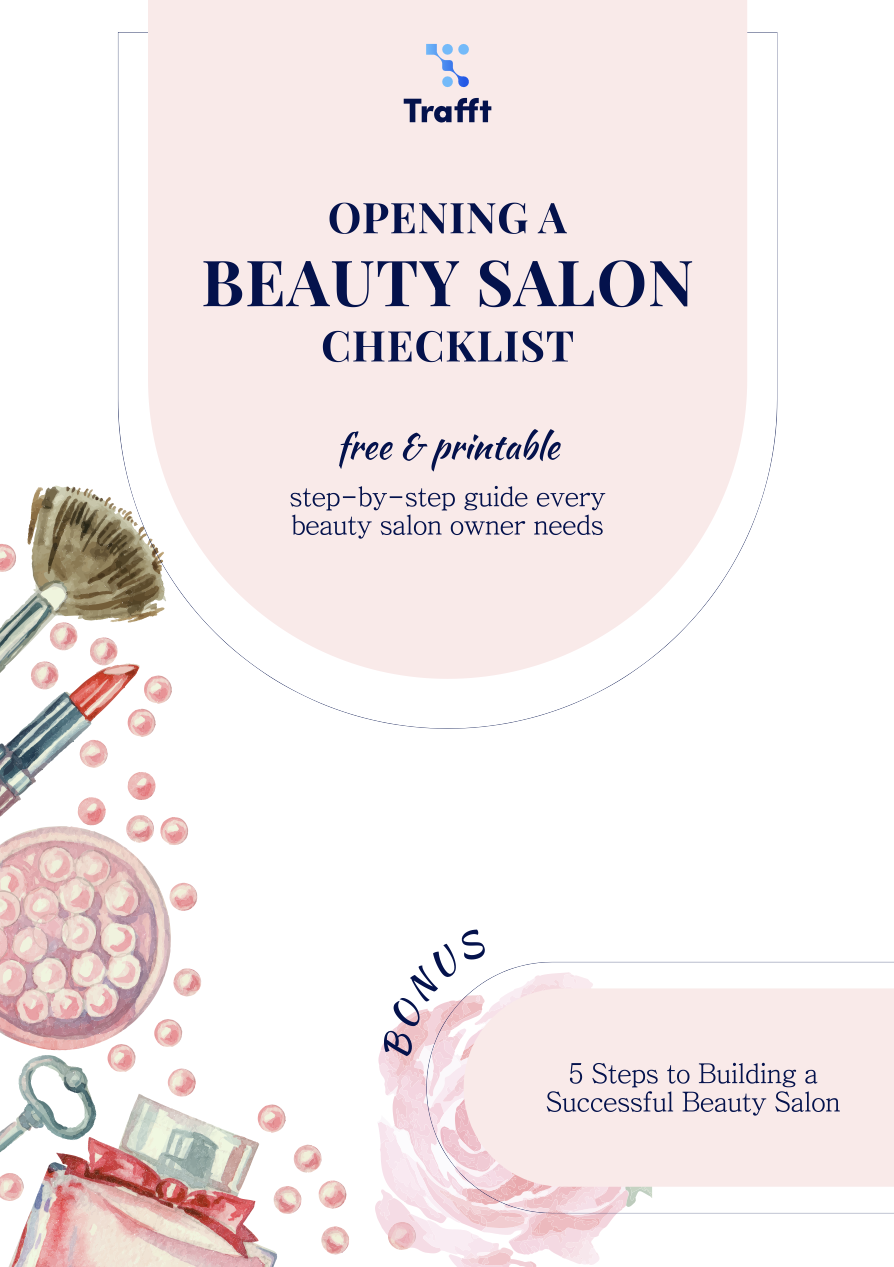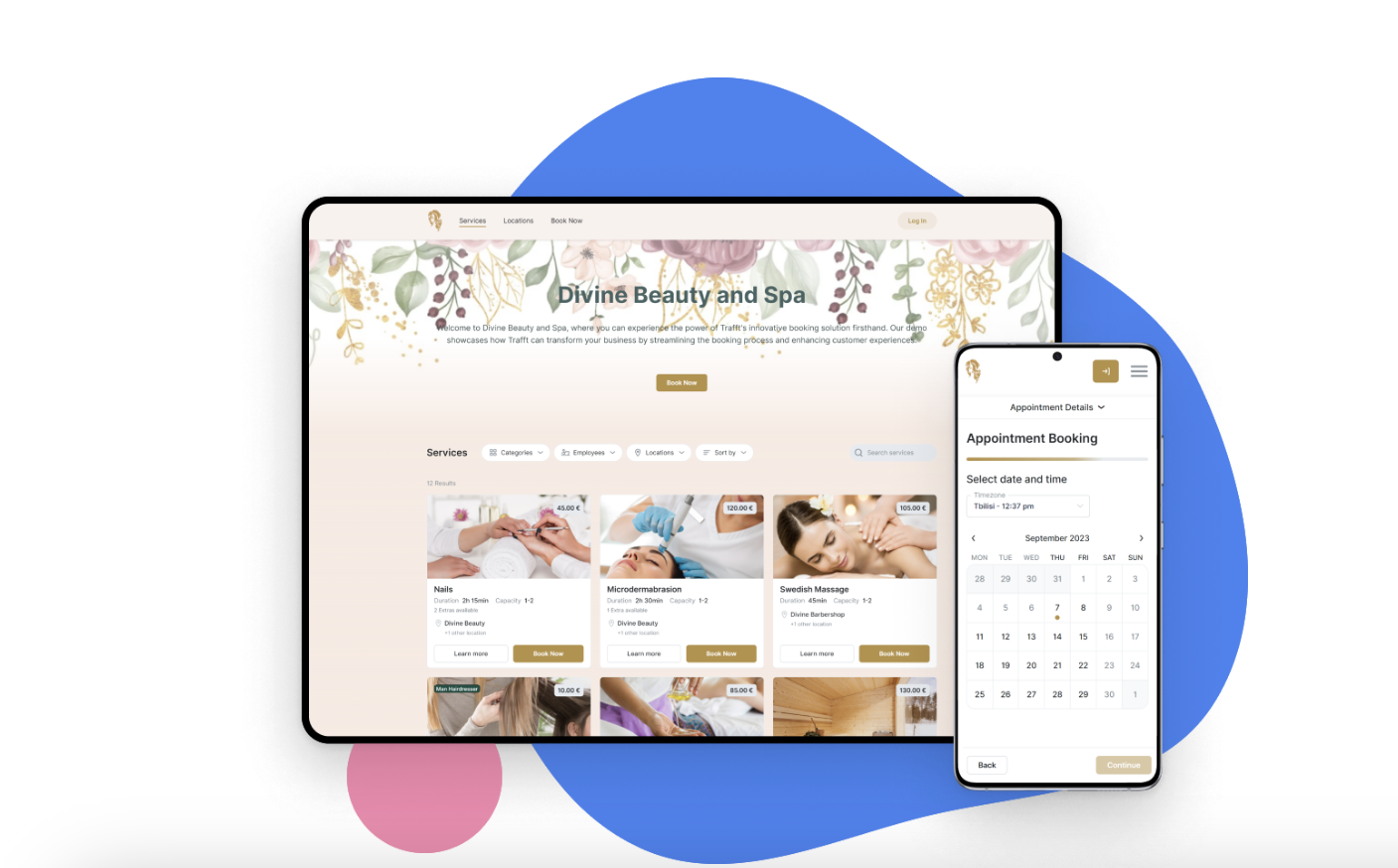If you’re stepping into the salon world, knowing whether to go with a commission-based salon or booth rental business model can make up all the difference. The decision you make will not only affect finances and growth prospects but also influence your day-to-day operations and the long-term success of your business.
Both models have their perks and can make your business quite successful and profitable if you do it right. So, let’s see what the difference between a commission-based salon vs. booth rental is, and how to choose one that aligns best with your goals!
Thank you for subscribing. Check your mail for details
What is a Commission-Based Salon?
Under this business model stylists are employees of the salon, and earn a percentage of the revenue from the services they provide. The percentage they earn can vary depending on various factors, such as their skill levels, the geographic location of the salon, and the salon’s policy. So, a percentage of the revenue goes to the stylist, and the rest goes to the salon.
How are earnings typically calculated?
In a commission-based salon, earnings are directly tied to the amount of service the stylist provides, and the amount of product they sell (if your salon offers products for sale). For instance, if a stylist has a 40% commission rate, and completes a service that costs $100, they earn $40.
This model motivates stylists to increase their number of services and upsell products since their income is directly related to the number of services they provide.
Typical commission rates fall between 30% and 60%. For a beginner stylist, they might start at a lower end of the spectrum and build their way up, as they acquire more clientele and skills.
Check out a detailed guide on how commission-based pay works in a salon!
Benefits of working in a commission-based salon
- Structured support: Stylists receive administrative and operational support, such as appointment scheduling and client management, which allows them to focus more on their craft.
- Provided supplies: The salon typically provides all necessary tools and products, reducing the stylist’s personal investment in these expensive essentials.
- Marketing by the salon: The salon often handles marketing and promotion, helping stylists build their clientele without personal expense or effort.
Potential drawbacks:
- Less control over pricing and schedule: Stylists have limited say in setting prices for services, and might have less control over their working hours, as these are often determined by the salon to ensure consistent service availability.
- Dependency on the salon traffic: Since income is based on client appointments, stylists might experience fluctuations during slow periods if the salon doesn’t attract enough clients.
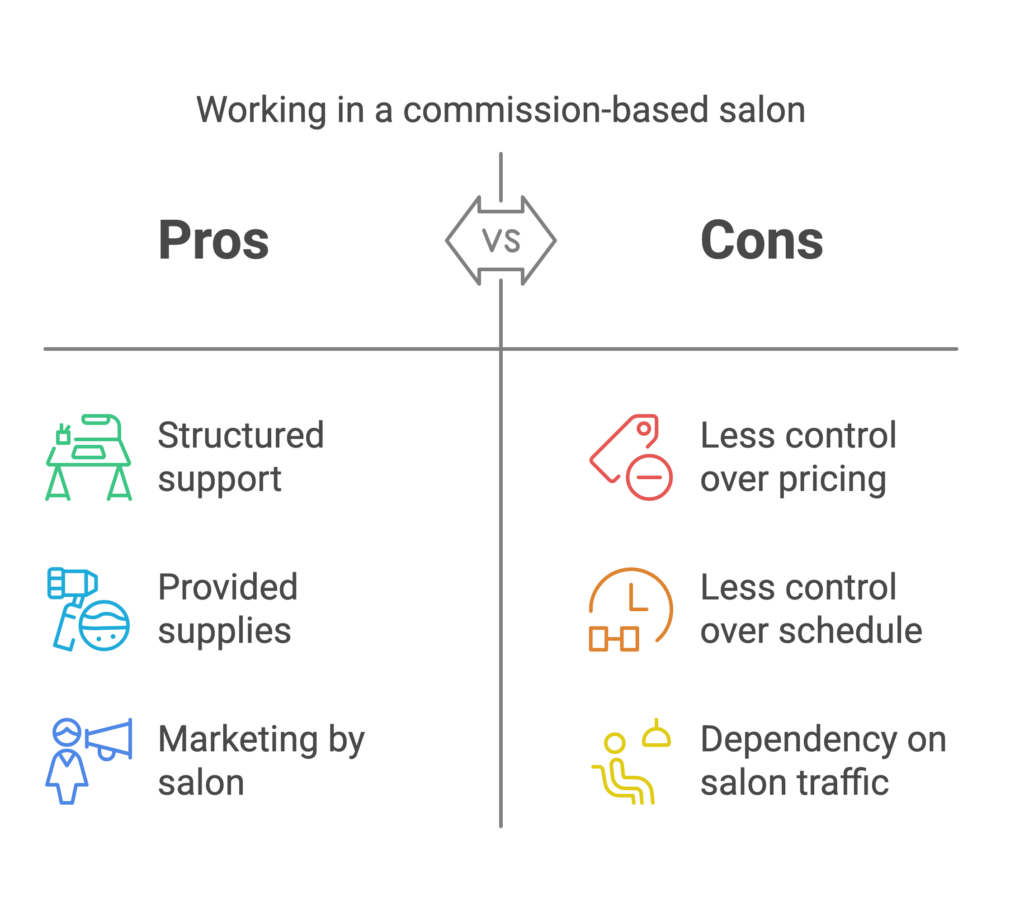
Understanding commission-based models is important not only for financial implications but also for shaping the workplace environment and ensuring stylist satisfaction.
What is a Booth Rental Salon?
In a booth rental salon, stylists rent space within a salon and run their own independent business within your space. This model is like a small business where each stylist is their own boss.
In this model, stylists pay a fixed rent, weekly or monthly, to use your salon space and facilities. They handle their own bookings, payments, and client management. They have the freedom to operate as a separate entity under the broader umbrella of the salon’s location and amenities.
What are the costs for a booth rental?
Costs can vary depending on the location, reputation of the salon, and the amenities provided. Common expenses include the rental fee, utilities, and the cost of personal supplies and tools. Also, stylists might need to invest in their own product stock to use and sell, which adds to the overhead.
Benefits of choosing booth rental
- Greater autonomy: Stylists can set their own hours and manage their business as they see fit. This offers greater flexibility than in a commission-based model.
- Freedom to set prices: Stylists can set their own prices, and potentially earn more based on their professional reputation and service quality.
- Personal brand development: Stylists have the opportunity to grow and promote their own brand, which can lead to greater personal recognition and client loyalty.
Potential drawbacks:
- Additional overhead cost: Booth renters must manage all business-related expenses themselves, beyond just rent. This might include everything from purchasing supplies to investing in marketing.
- Personal marketing and supplies: Attracting new clients and maintaining a stock of products falls entirely on the stylist, requiring additional time and financial resources.
- Less predictable income: Income stability can vary, as it directly depends on the stylist’s ability to attract and retain clients.
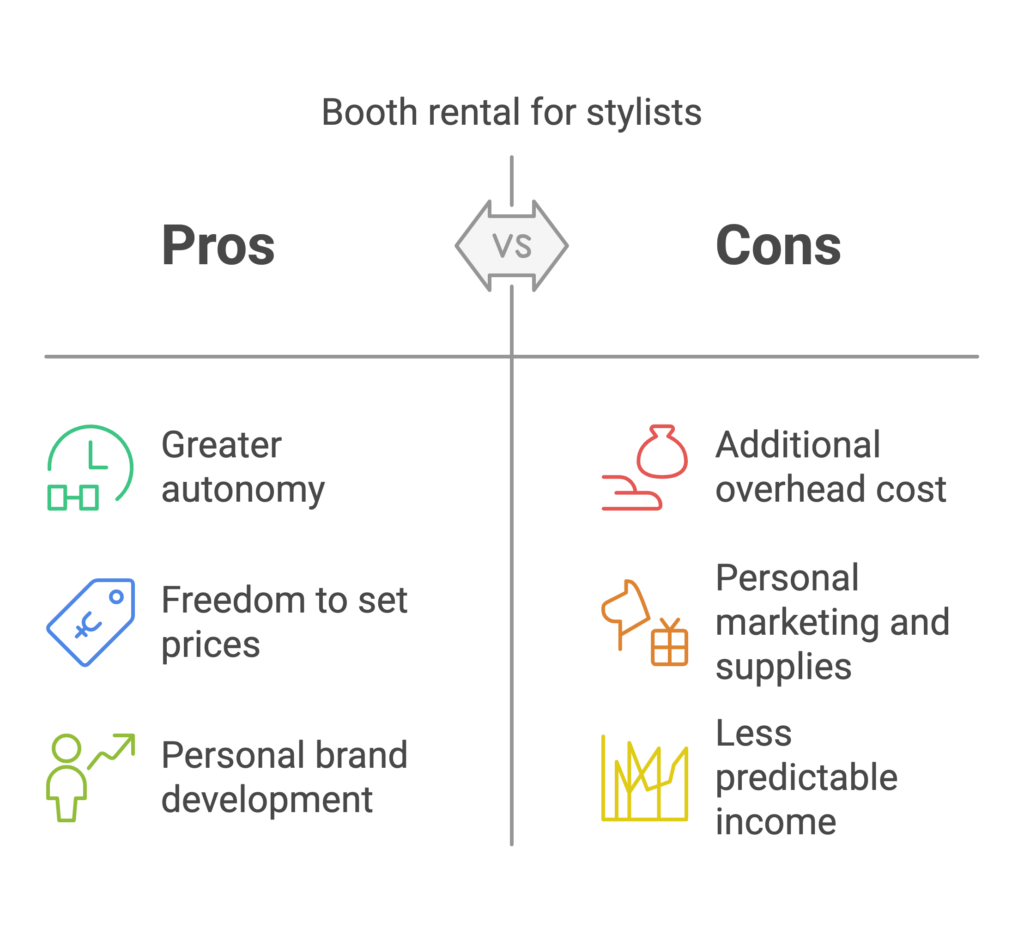
For salon owners, booth rental models can attract experienced stylists who like to have control over their business operations. However, it requires careful management to ensure all renters contribute positively to the salon.
Learn booth rental tips and best practices to know!
Commission-Based Salon vs. Booth Rental - Which Model Is More Profitable?
Commission-based model
As a salon owner operating a commission-based business model, your revenue comes from a share of the services that your stylists provide. Stylists earn a set percentage of the revenue they generate, and the rest goes to you. This model allows you to benefit from the total volume of services your team provides.
- Revenue generation: Salon’s income is directly related to the productivity of the employees. If stylists are busy and can upsell services and products, your share of revenue increases. This model can be particularly beneficial during peak times when customer flow is high.
- Predictable earnings: Since the salon takes a percentage of each transaction, you can predict earnings more compared to the booth rental model, especially if you have a steady stream of clients.
- Investment in staff: Salon owners often invest in staff training and marketing to improve their skills and attract more clients, which can further increase the salon’s earnings.
Booth rental model
Here, you rent out your space to stylists who work independently within your salon. This model offers a different financial dynamic since all the income you get is derived from rent payments rather than service percentages.
- Steady rental income: A steady stream of income from rent is the primary advantage of this model. With booth rentals, you are less dependent on the number of clients your stylists serve. This can provide a stable income, and reduce the uncertainties associated with fluctuating service demands.
- Lower operational costs: You won’t be responsible for the stylists’ supplies, products, or utilities. This will reduce overhead costs significantly, as the renters are responsible for their own expenses.
- Less financial risks: You will face less financial risks since the income is generated from the rent. There will be no fluctuations, and the fixed rent payment ensures consistent revenue regardless of the business cycles.
Comparison and considerations:
- Risk vs. reward: The commission-based model can generate higher returns if your salon has high customer traffic and highly skilled staff. Still, it involves greater risk and requires active management. The booth rental model offers a steady stream of revenue and less financial risk, making it a good choice during economic downturns or in less busy locations.
- Management style: You need to take into consideration your financial goals and management style. If you prefer more control over the salon’s operations and branding, then a commission-based model might be a better choice. If you’re looking for simpler management and a steady income, booth rental might be a better choice.
When choosing a model and creating your salon business plan, you need to consider potential earrings, financial risks, and preferred management style. You need to evaluate your market, financial goals, and personal management style to determine the best fit for your business strategy.
Legal Considerations and Contracts
Understanding legal and contractual frameworks for commission-based and booth rental business models is very important for safeguarding your business and ensuring clarity and fairness in your dealings with stylists.
In a commission-based model, stylists are typically classified as employees. This means you need to manage legal obligations such as payroll, withholding taxes, and providing employees benefits if applicable. These contracts usually outline payment percentages, duties, and the use of salon resources. Additionally, you need to comply with local labor laws, such as working hours, minimum wage requirements, and dispute resolution procedures.
In a booth rental model, stylists are independent contractors who rent space in the salon. Here, the most important document is the lease or rental agreement between the salon owner (landlord) and the stylist (tenant). This agreement should clearly define rent amounts, space usage, duration of the rental term, and other terms such as utilities and maintenance responsibilities.
The agreement needs to comply with local commercial leasing laws. Salon owners must be careful not to exert employer-like control over booth renters to avoid misclassification issues, which can lead to legal complications.
For both models, it’s essential to have clear, legally sound contracts and agreements to define relationships and responsibilities clearly. You should consult with a legal professional to draft these documents, to ensure they are comprehensive and compliant with all applicable laws.
Which is Better, Booth Rental or Commission-Based Salon?
As we saw, both models have their advantages, but choosing the right model for you is more than just assessing financial profitability - it’s about aligning the business model with your management style, financial goals, and legal considerations.
Each model has its challenges, and the decision should be based on a thorough evaluation of your business priorities, personal preferences, and the legal landscape of your location. Whichever you choose, you should check out a salon scheduling software that can help you manage your employees, keep bookings well-organized, and automate repetitive tasks,
With Trafft, you can rest assured that your business will thrive!

